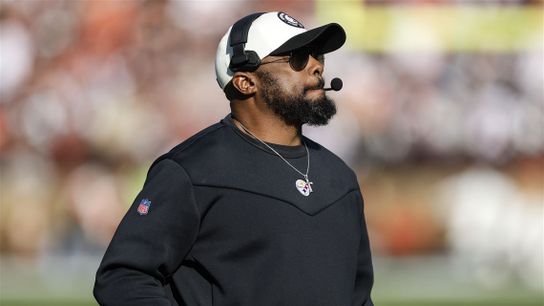Mike Tomlin has quickly established himself as one of the NFL’s most prolific coaches since taking on the role in 2007 as the head coach of the Pittsburgh Steelers at just 35 years old. In only his second season, the team reached an incredible milestone by winning Super Bowl XLIII. Over the 16 seasons since, Tomlin has never had a losing record—a remarkable achievement unmatched in the NFL.

ESPN
Late Steelers owner, Dan Rooney (right) alongside Head Coach Mike Tomlin (middle) and former quarterback Ben Roethlisberger (left) after a victorious Super Bowl XLIII.
Now 52, Tomlin might be facing his most challenging season, following a painful loss to the Baltimore Ravens in Week 16 and the Kansas City Chiefs in Week 17. The defeats have made their path to becoming Super Bowl contenders far more complicated, raising doubts among fans and analysts alike—particularly with Russell Wilson's inconsistent performances.
However, if there is one thing the Steelers can count on, Tomlin will not let his team go down without a fight. His success stems from his ability to connect with his team while maintaining a strategic edge. However, some critics argue his reliance on conservative play-calling occasionally limits offensive explosiveness.
For sports enthusiasts, understanding a coach's strategy is crucial—especially when placing wagers on a Steelers game. Observing Tomlin’s ability to rally his team in clutch moments versus where his decisions falter can provide valuable insights. So once you decide to register with your favorite sportsbook or choose to go down a different route and register at NovaJackpot Casino - which also offers fantastic sports betting options - you’ll realize how knowledge of coaching philosophies can give you an edge in predicting game outcomes.
Let’s take a look at how Mike Tomlin’s coaching philosophy works—and why it might sometimes fall short.
Great Track Record
Tomlin's consistency has propelled the Steelers to new heights. The head coach has kept the team competitive for almost two decades, avoiding a losing record for 18 straight seasons. This steady leadership has been the backbone of the team, helping them navigate tough seasons and stay competitive in the challenging AFC North division.
Tomlin’s consistency isn’t just about the numbers—it’s about the culture he has built. His leadership fosters accountability and resilience, keeping the team focused no matter the challenges they face. Even during times when the quarterback situation was less than ideal, Tomlin’s steady hand kept the team on track. Now, with a more solid offense, his consistent approach continues to drive the Steelers forward.
Clear Communication
The Steelers have grown to appreciate Tomlin’s straightforward communication. As head coach, he doesn’t hesitate to give honest feedback, making sure every player knows exactly where they stand. For example, he didn’t hold back in pointing to Russell Wilson and the defense as key reasons for the Steelers’ loss to the Ravens. This kind of honesty builds trust and accountability, with players knowing exactly what’s expected of them and what happens if they don’t deliver.
On top of that, Tomlin is known for his “Tomlinisms”—simple, catchy phrases he uses to break down complex ideas, making them easy for his players to understand and remember. His mix of honesty and clarity has been a huge part of his success.

Steelers.com
Pittsburgh Steelers Head Coach Mike Tomlin (left) and quarterback Russell Wilson (3) during a 2024 home game at Acrisure Stadium in Pittsburgh, PA.
Building Trust
Tomlin’s coaching success is rooted in trust—trust in his players and the system he’s built. This trust drives everything he does, shaping how he tackles challenges and motivates his team. Even in situations like the absence of star receiver George Pickens, Tomlin showed complete confidence in the rest of the group, demonstrating his belief that every player can step up when needed.
Adaptability
Several factors can impact the outcome of a football game, which is why the ability to adapt is crucial. Tomlin understands this better than anyone, successfully adjusting his coaching style to fit the unique strengths and weaknesses of his players. Rather than sticking rigidly to one system, Tomlin tailors his approach to bring out the best in each player, ensuring their skills are maximized for the success of the team.
Room For Improvement
Despite the Steelers' solid 10-6 record in the 2024 season, their 27-13 loss to the Philadelphia Eagles exposed some major problems. After the game, Tomlin didn’t hold back, admitting that the coaching staff shared a lot of the blame. He pointed out that the preparation and in-game adjustments weren’t up to par against a strong Eagles team.

Alysa Rubin / Pittsburgh Steelers
Pittsburgh Steelers Head Coach Mike Tomlin during a game against the Philadelphia Eagles in December of 2024.
This loss highlighted a bigger issue for the Steelers: inconsistency. While their season has been strong overall, games like this raise doubts about their ability to perform under pressure. With the playoffs coming up, Pittsburgh will need to address these problems, particularly in game planning and execution during critical moments. At the end of the day, Tomlin isn’t trying to prove that his coaching style is perfect—he’s well aware of its limitations. What remains to be seen is how he will address them moving forward.



